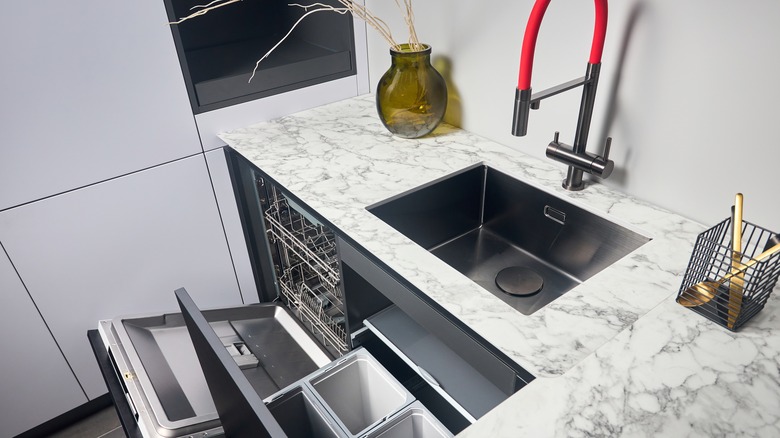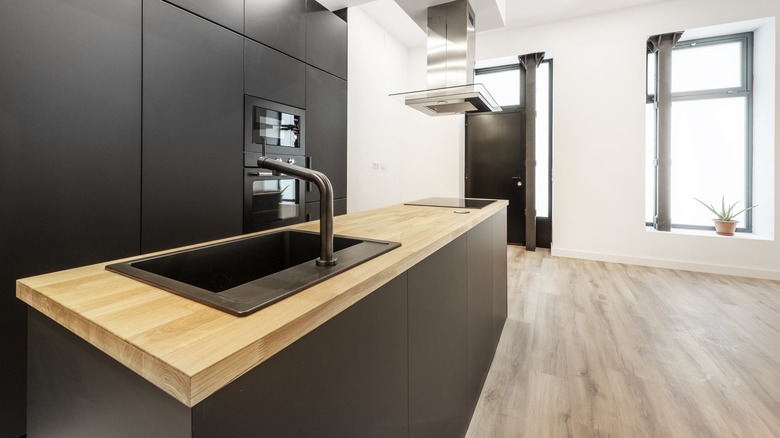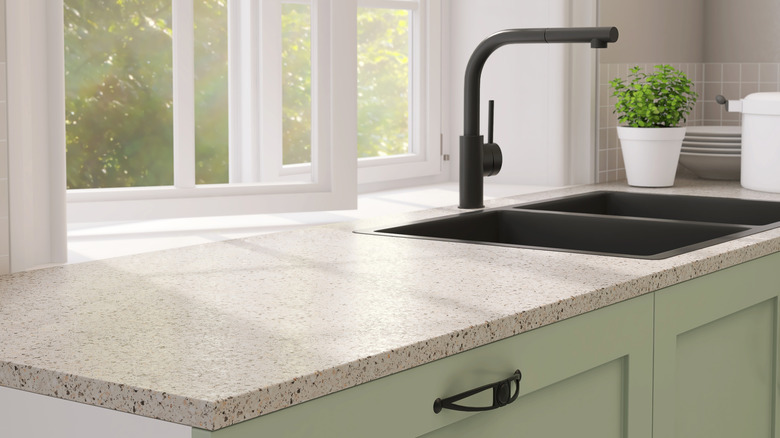The Benefits & Drawbacks Of Installing Formica Countertops In Your Home
If you're wondering exactly what the difference between Formica® and laminate countertops is, it's all in the name. Formica® is one of several brands consumers can explore when looking for laminate or acrylic solid surfaces as an alternative to quartz and natural stone countertops. Some people associate modern Formica® with sheeting countertop products sold by the company many decades ago; today's options not only look better, but they also tend to last much longer and don't scratch as easily, so those are definite strong suits.
Formica® high-pressure laminate material is made with large sheets of paper that have been soaked in melamine resin, heated, and pressed together. After curing them in a furnace, they're attached to particle board to make them hard-wearing. They also make an acrylic product called Everform® Solid Surface that doesn't have seams and wears even better than laminate. Of course, the fact that they're not made using natural stone works against these countertops in the minds of some consumers, offering a drawback to installing them during a remodel. Looking at all the good and bad points of selecting Formica® countertops might help you decide if they're going to be right for your future home improvement projects.
What makes Formica countertops great
The ease of cleaning Formica® countertops is another check in the plus column. You can use mild soap and water to clean up spills and messes easily. And even though the laminates don't stain frequently, the manufacturer recommends applying rubbing alcohol with a soft cloth as a stain remover and then rinsing the spot with water and drying it thoroughly. Acrylics can also be buffed to make them shine as needed. Not having to seal either type of Formica® countertop every year is another reason many consumers select them over natural stone.
The amount you can expect spend on laminate countertops can also be substantially less in comparison to materials like granite and marble. For instance, adding granite countertops can cost around $120 per square foot while the manufacturer estimates $14 to $38 for Formica® laminates or $42 per square foot for solid surface material. That alone steers many budget-minded shoppers toward this brand. It's also possible to DIY laminate countertops if you're good with power tools, but many people leave it to the pros.
There are lots of different colors and patterns to choose from, including those that mimic expensive stone. Laminate selections that look like wood or marble and solid surface materials that imitate black granite and white quartz are also available, so there's no shortage of design options with this brand. None of them have a brown edge line like products of the past either, which adds to their attractiveness.
Why you might decide on countertops other than Formica
The old-fashioned connotation of Formica® with its limited selections and brown edge lines is one of the drawbacks of installing this product. It's just not perceived as stylish enough, so when homebuyer's hear Formica®, they may draw a negative conclusion even if you pick the best-looking product the brand offers. It can vary from area to area, but many real estate agents will deduct thousands from a listing for a home with laminate countertops depending on the type you choose, so it can indeed impact the resale value of a home.
And while Formica® is easy to keep clean, you do have to wipe excess water away to make sure that it doesn't penetrate the seams and damage their laminate material. You must take care when placing fresh-off-the-stove pots and pans on it, too, since it's only heat tolerant up to 275 degrees Fahrenheit for a brief period. Dropping heavy items on it can also mar the surface. Once damaged — whether from water, excessive heat, or a break — it's hard to fix laminate. Most of the time you'll have to replace the entire countertop in that area of your room. According to the manufacturer, Formica® acrylic countertops are more forgiving when it comes to moisture and heat, however. Taking all the benefits into consideration, many consumers do opt for modern Formica® residential products, but it's good to be aware of the drawbacks, too.


